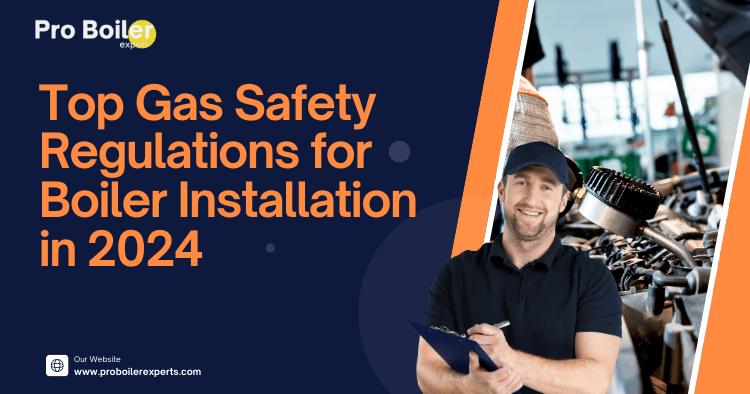Table of Contents
- Introduction
- 1. Water Quality Standards
- 2. Water Usage Efficiency
- 3. Drainage and Wastewater Management
- 4. Legionella Control Measures
- 5. Compliance and Reporting Requirements
- Conclusion
Introduction
As we step into 2024, understanding water regulations for boiler installation is crucial for compliance and efficiency. These regulations ensure the safety and quality of water and promote sustainable practices. Whether you are a commercial property owner, facility manager, or contractor, being aware of these regulations will help you navigate the complexities of installation and maintenance. Let’s dive into the top five water regulations that will shape boiler installations this year.
1. Water Quality Standards
Water quality standards are vital in ensuring that the water used in boilers meets specific criteria to prevent damage and ensure efficiency. In 2024, regulations are becoming stricter to protect public health and the environment.
Key Points:
- pH Levels: The acceptable pH range for boiler water is typically between 10.5 and 11.5. Deviating from this range can lead to corrosion.
- Dissolved Solids: Total dissolved solids (TDS) should be monitored, with a general limit set at 500 mg/L for safe operation.
- Heavy Metals: Regulations require that levels of contaminants like lead, copper, and iron are kept to a minimum.
FAQs:
- What tests should I perform to ensure water quality?
Regular water testing should include pH, TDS, and heavy metal content. - Where can I find more information on water quality standards?
For detailed guidelines, refer to the Environmental Protection Agency (EPA).
For more insights on heating systems, check our article on the Top 5 Benefits of Choosing Condensing Boilers.
2. Water Usage Efficiency
Water usage efficiency is not just a buzzword; it’s a requirement in 2024. Regulations are pushing for the reduction of water waste, which can result in significant cost savings and environmental benefits.
Key Points:
- Water-Efficient Technologies: Installing high-efficiency boilers that utilize less water is encouraged. Look for models with an Energy Star rating.
- Leak Detection Systems: Implementing technology that detects leaks can dramatically improve water conservation.
| Technology Type | Benefits |
|---|---|
| High-Efficiency Boilers | Reduced water consumption |
| Leak Detection Systems | Prevents water wastage |
FAQs:
- How can I improve water efficiency in my facility?
Regular maintenance and upgrading to high-efficiency systems can help. - Are there incentives for using water-efficient technology?
Yes, many local governments offer rebates and tax incentives. Check with your local utility provider.
Explore our guide on Top 5 Smart Boilers Revolutionizing Home Heating in 2024 to learn more about efficient technologies.
3. Drainage and Wastewater Management
Proper drainage and wastewater management are critical to protecting local water sources from contamination. Regulations are tightening in 2024, emphasizing the need for effective management systems during boiler operation.
Key Points:
- Separation of Waste Streams: Regulations require that boiler wastewater is separated from other types of wastewater to prevent contamination.
- Use of Sumps and Pumps: Adequate sumps and pumps should be in place to manage and treat wastewater before it is discharged.
FAQs:
- What are the penalties for non-compliance in wastewater management?
Penalties can range from fines to forced shutdowns of operations. - Where can I get assistance with wastewater management?
The EPA provides resources and guidelines for effective wastewater management.
For more about installation considerations, see our article on the Essential Pre-Installation Checklist for Your New Boiler.
4. Legionella Control Measures
Legionella bacteria can pose serious health risks, especially in boiler systems that utilize water for heating. In 2024, regulations are becoming more stringent to ensure that facilities take proactive measures against this threat.
Key Points:
- Regular Monitoring: Facilities are required to monitor water temperatures and quality to inhibit Legionella growth.
- Risk Assessment Plans: Developing a comprehensive risk assessment plan is now mandatory for all commercial boiler installations.
FAQs:
- How often should I check for Legionella?
Regular checks should be conducted quarterly, with more frequent testing in high-risk areas. - What temperature should water be maintained at to prevent Legionella growth?
Water should be kept above 60°C (140°F) to effectively kill Legionella.
Learn more about safety measures in our article on the Top 7 Safety Precautions for Boiler Installation.
5. Compliance and Reporting Requirements
Staying compliant with water regulations is not just about installation; it involves ongoing reporting and documentation. In 2024, facilities must be prepared to submit compliance reports to local authorities.
Key Points:
- Documentation: Maintain all records related to water quality tests, maintenance logs, and compliance checks.
- Regular Audits: Expect regular audits by local regulatory bodies to ensure compliance with water regulations.
FAQs:
- What happens if I fail to comply with reporting requirements?
Non-compliance can lead to fines, legal action, and operational interruptions. - How can I stay updated on regulations?
Subscribe to newsletters from resources such as the American Society of Mechanical Engineers (ASME).
Check out our guide on Understanding Boiler Installation Costs: Complete Breakdown for 2024 for financial implications related to compliance.
Conclusion
Understanding and adhering to water regulations for boiler installation in 2024 is essential for safety, compliance, and sustainability. By focusing on water quality standards, efficiency, wastewater management, Legionella control, and compliance requirements, you can ensure that your boiler system operates smoothly and responsibly. Staying informed and proactive will help you meet legal obligations and contribute to the overall health of your community and environment.
For more information on best practices and regulations, consider reaching out to local regulatory bodies or consulting professionals in the field.
By keeping this guide handy, you’ll be well-equipped to navigate the water regulations landscape in 2024 and beyond!





